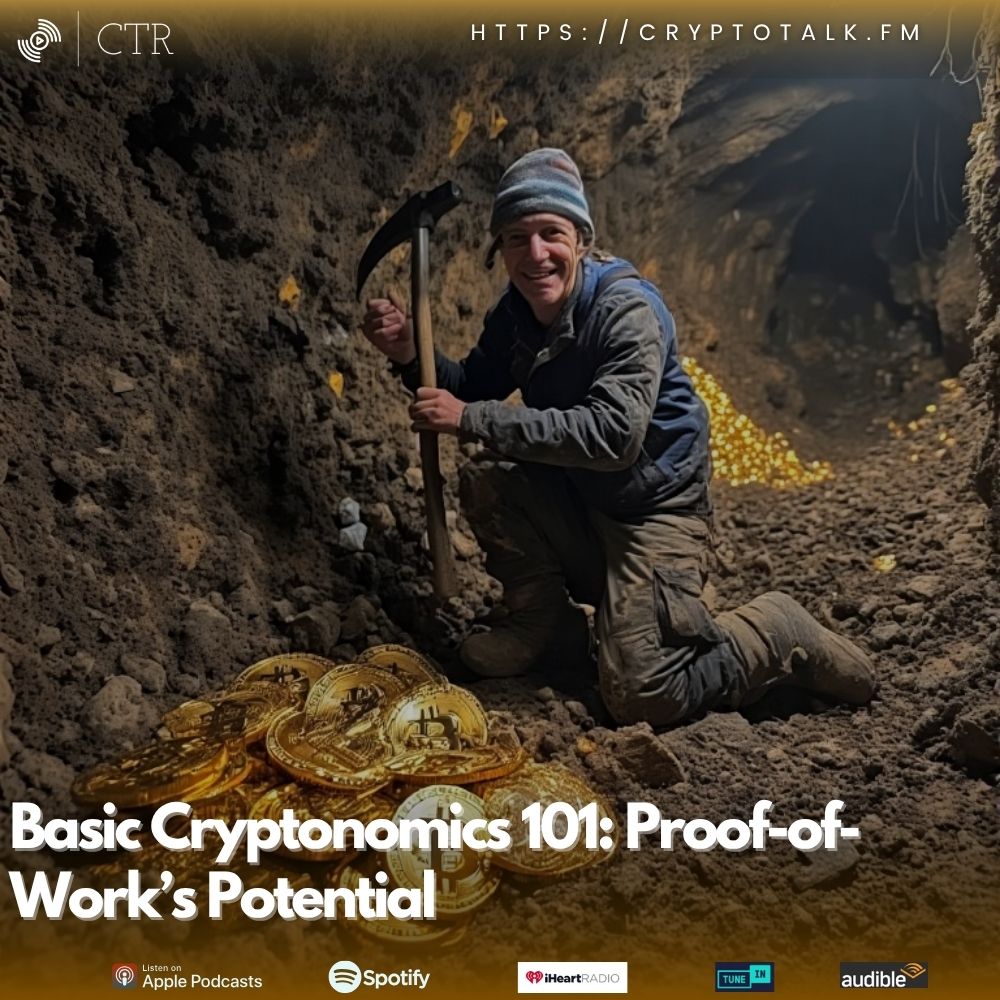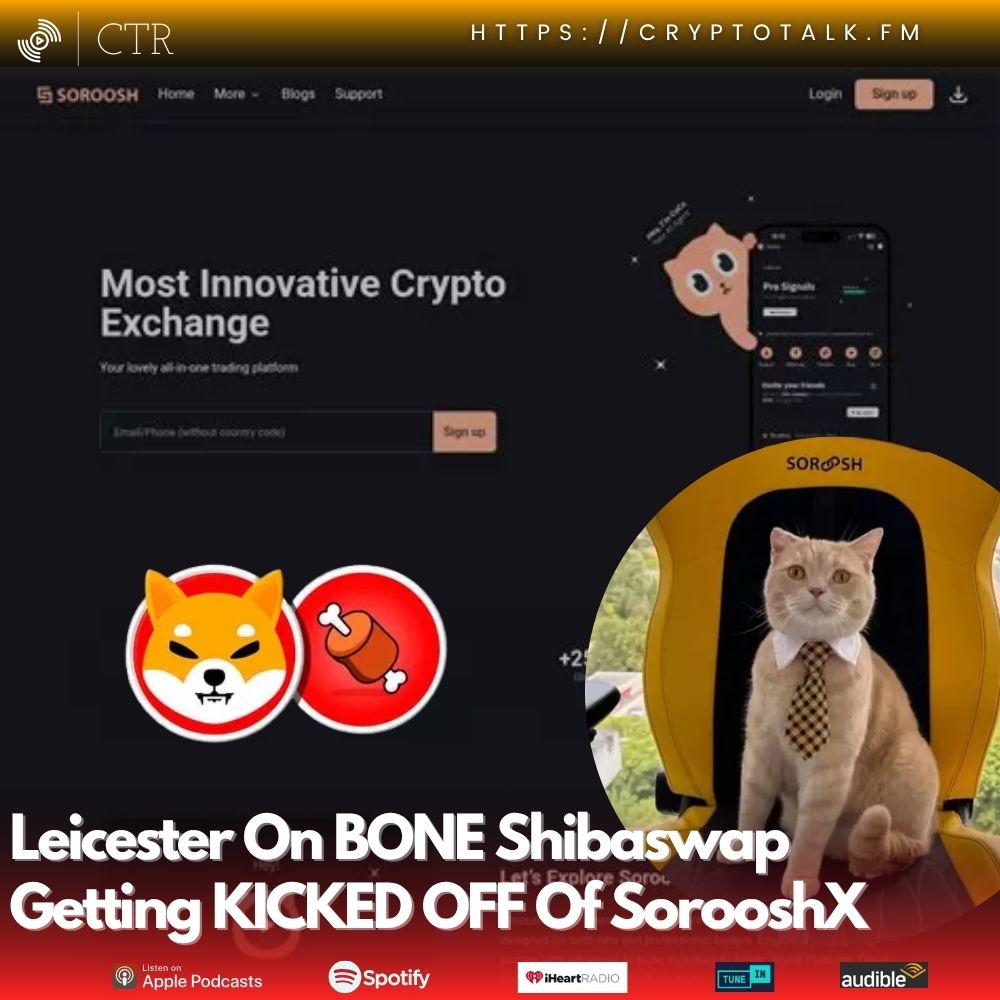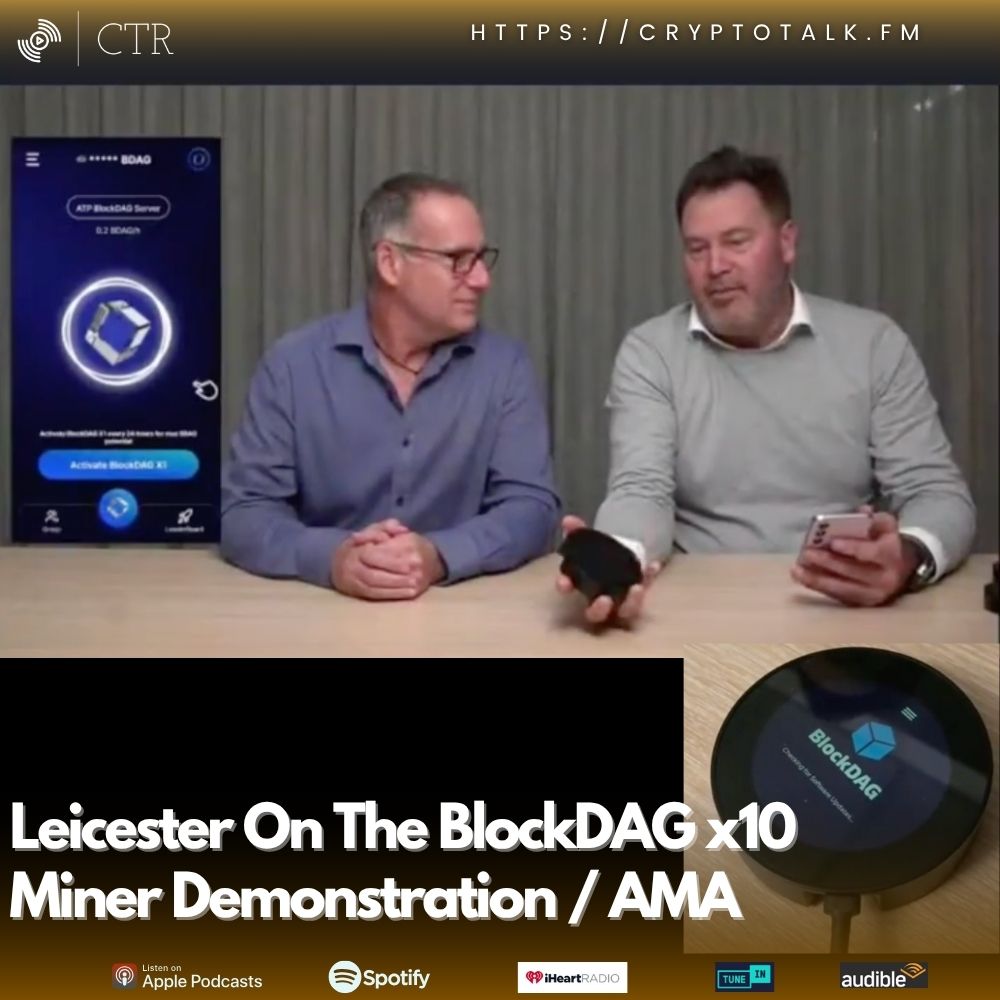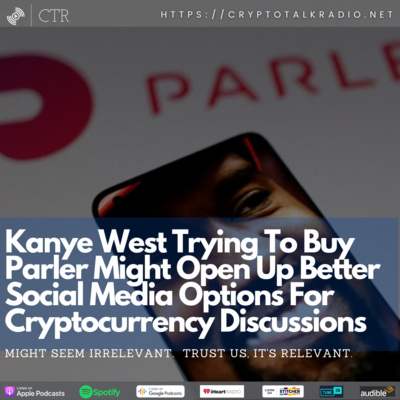[00:00:01] Welcome to Crypto Talk Radio, the podcast for everyday investors like you. Visit us on the
[email protected] and now here's your host, Leister.
[00:00:13] Thank you for that, Bailey. And welcome everybody out there in Crypto Talk radio
[email protected]. is it becoming clear yet? Are you listening yet? If you're new, you're, you're going to hear me take a victory lap for the first time. That's fine. People that are not Louis, they've been listening hopefully for a while and have paid attention when I said that Ethereum is the key to it all. Ethereum unlocks all the other magic. Bitcoin has gone. It got up to about 120 grand but didn't go too much further. And then Ethereum, I think it got as high as like 3, 800 bucks, which isn't bad. We're still not that all time high. But Ethereum is where it begins and ends. Now Ethereum's kind of settling a little bit. Things consolidate and Solana started ripping and some of the other ones are going to run as well. Hopefully it's clear how the money flows and hopefully it's also clear bitcoin should be. If, if everything was so tight together as some people say it is, you expect Bitcoin to be at 150 grand by now. Do I think it still gets there? Yeah, I'm just saying that by now you'd expect it to be given Ethereum because remember Ethereum not long ago was like 1700 bucks and now it got up as high as $3800. This is a massive run up and I don't think we're near the end. I think it's just the beginning. Some people had some things they talked about proof of stake that I'm gonna be covering today. Today will be a short episode. There wasn't too much going on that you don't already see yourself. The run ups are what they are, they're valid. Hopefully you took profit opportunities and hope you listen the whole time. You know, if you listen the whole time, if you listen the whole time and I'll get to this in a second, but if you listen the whole time after the FTX business you made out a lot of. Some people might not have been able to put a lot in, but even if you only put like 500 bucks in there, right, you still made a pretty good amount of money if you were patient and tolerant and hopefully you understand it's a long game. All of it's A long game. It doesn't happen quick. You're not supposed to become millionaires quick. Those days are gone. Meanwhile, we're going to talk of some crypto, and I'll hopefully help you out with navigating these new waters.
[00:02:23] CoinDesk.com and let's go ahead and zoom out to the month chart. Let's start with Ethereum, because of course, I'm an Ethereum kind of guy instead of a Bitcoin. But we're going to start with Ethereum. And I, I want to emphasize just how powerful this is.
[00:02:38] So over the month, just in the month, just shy of 2300 bucks, a high at 3, 800 bucks, which is where we are right now.
[00:02:48] And then over the past 24 hours, here's the beauty, right?
[00:02:53] We've been in this 3700, 3800 ish range in just the past day with no signs of slowing. But over the past month, it was as low as 2200. That's a huge jump in price for Ethereum. I can't overstate how amazing of a jump it is on Ethereum. Yet if you look at the same month range on Bitcoin, although it had a, it had a jump, certainly it was not as substantial as it was on Ethereum. I'll get to that in a second. So Ethereum, or excuse me, Bitcoin, rather, on the month, just shy of 102 grand on the low side, 122 grand on the high side. You're like, well, that is a lot of money.
[00:03:40] Well, it is, right? A 20,000 jump is certainly nothing to shake a stick at.
[00:03:45] But a 20,000 jump, okay, that's based on the price total, all based on the price. That's 1/6. So 1/6 of price that it increased. It's not bad, you know, it's not terrible. You know, a little bit over 10, 15, you know, percent or some odd, you know, it's not that terrible. I mean, I'm not trashing on Bitcoin by any means, but when I look at Ethereum, 2200 bucks, and it goes to $3800. A climb of $1600.
[00:04:21] Almost, almost 100% gain. Do you understand the difference?
[00:04:27] That's the, that's the power of what I'm talking about. The power. When you look at it on numbers, it doesn't seem like it's a significant sway. When you look at it on percentages, it is, because as I said on an old episode of Crypto Talk fm, Ethereum's price right now should easily be in the five figures.
[00:04:48] That's what I'm talking about. This level of climb is telling you that this is hitting a fever pitch and it should be absolutely way higher than it is. And it's a joke that it's as low as it is. And it should have gone, I don't want to say to the moon, but it certainly should have been running harder than it did. And the fact that it didn't to me was an insult and a joke. And I'm glad to see that it's finally running up and it's running up at a stronger pace than bitcoin. Now, some of that is money flowing from bitcoin to Ethereum as people fumbled into it. Point is, I'd like to see more of this. And you see some of the other alts like Solana benefiting from some of this liquidity flow. So everybody that's paying attention and everybody is doing it right, or we're all benefiting, we're all feeling very good about the price movements that we see and that's where we want to be that rhyme. So the bottom line, I still have my eye on Ethereum only because it felt, it has felt. And if you listen for a while, you heard me say this, it felt like it's the center of it all, not bitcoin. Some people say it was bitcoin. You probably heard YouTubers telling you that who's telling the truth and who's not, right? And it's not saying that bitcoin does not have value. That's not my point. The point was look at how much Ethereum went up percentage wise compared to how much bitcoin went up. Part of that is bitcoin's price. Part of that is sentiment. Part of that is just common sense. Because Ethereum was too damn low, right? When it's too. It's like a rubber band, you know, when it's so damn low, it's gonna have to shoot up stronger.
[00:06:26] Bitcoin has not had that rubber band event.
[00:06:29] So people expect the rubber band event to happen. That's why some were predicting that bitcoin was crash, going to crash back down to like the 80,000, $70,000 mark. Do I think that happens? I don't think so, but it could. And we have to kind of sit back and watch and see what this whole holds. But in the short, this is one of those moments, right? You have to watch and see all projects and the cores cannot steer you wrong, as I've said. And you put into multiple of Them and just watch it and take profits off ones. Well, let's say you tossed, you know, 500 bucks at multiple of these. The amount of money that you should have made off of Ethereum alone.
[00:07:08] If you took out the profits and then let the rest of it ride, you should be sitting major pretty and you can buy into other stuff because you now see that liquidity is flowing in the other directions to those. So you can put money into those and watch those go up and at some point those are going to make you some profit to where you can get back into bitcoin. That's the cycle to where it'll come to a point where if you, once you're good at it, you won't need to put any new money in it because you're good at timing the market. It takes practice and it's not something that happens quick. And you do have to train yourself away from the garbage out there. You know, tokens like a devi. You know, it's crap, right? You have to train yourself away from the garbage out there. But once you can train yourself away from the garbage, you realize, okay, Leicester's right, it's all about the cores. They can't steal you raw. And if you focus on the cores and you practice only putting what you can afford to lose and only, you know, taking for profits, right, you realize it's a game. It's a game that you're playing and, and it's hard. It's hard. It's the temptation is what I mean. It's hard. It's hard not to just let sit there, let it go to whoever, how you could.
[00:08:16] But why, why when you could just take the profits out and put that profits, you know, margin into some other projects. That's my point.
[00:08:24] So hopefully people listening were able to get profits off these runs because these are good runs to make profits and those are opportunities that you look for. You're not going to see significant profit opportunities on a bitcoin because its price is already too damn high. And I said that it feels like it's inflated you, it doesn't mean it won't go up. I'm saying you're not going to get the same amount of profit potential that you're going to get with some of the alts because the alts are low. Hopefully that's clear for everybody.
[00:08:54] I want to talk just real quick. And this is, this is just in my opinion, something that is worth, it's worth the chat because I've had the same message myself in my head and I'VE said it on a couple of older episodes and I think it's good to put out. And like I said, it'll be a short episode because I think it's. This is a good 101 kind of conversation you might have heard, you know, proof of stay, proof of work. You know, all these proofs, right?
[00:09:25] There's Ethereum, which is proof of stake now and used to be proof of work. There's Bitcoin, which is proof of work.
[00:09:33] And some of the controversy around Ethereum, its price, its all time high. It was, it was proof of work at the time and mining was much more profitable under that just because of what it is.
[00:09:46] And you might not understand some of the chatter now around why we went to proof of stake and why proof of stake doesn't seem to currently make sense. And I thought it would be good to share my thoughts on the whole spectrum of proof of work. Proof of stake, okay?
[00:10:03] To understand this proof of work.
[00:10:08] The whole idea of proof of work is that there are miners, M I N E R S that are mining the various cryptocurrencies and then they're putting them into circulation.
[00:10:21] The mining is them solving their computers, solving complex issues and problems, okay? It also means that their computers are the ones that are performing the very transactions that you do.
[00:10:33] So when you do some sort of a transaction through a smart contract, something has to actually execute the code, right? So when you call it, you call a smart contract and you say, I'm doing a request to do a transfer of assets between my X and Y, so I want to give you X and I want to get Y back. That's what you're asking it to do. Well, something has to make that trade happen. So the smart contract has the code to do it.
[00:10:58] Your wallet does not have infinite code to execute across all these different contracts that are out there. It can read the code, at least for the initiate request. It can't read every single iota of code that's out there.
[00:11:12] So these miners, as they're solving these complex problems and they're finding blocks and doing all these things, part of it also is solving these problems of the transactions that are happening to make them happen. In other words, the blockchain needs to have these computers essentially doing work in order to make the transaction happen. And then, and then it takes time, right? So if you do a bitcoin transaction, it's why Bitcoin is a little bit slower than the equivalent on Ethereum.
[00:11:42] Proof of stake, which is what Ethereum is, is faster to Execute because there's more, there's more out there that are staked and staking than there would be that are mining on the proof of work side. So just by saturation alone, you get more performance benefits on proof of stake. The downside, as people have called out with proof of stake, is that it does lend itself to a little bit of centralization.
[00:12:08] Some have even called it oligarchy. The idea that certain larger, you know, it's all about how many tokens you have, right? And that, that makes your voice louder than everybody else's and makes your impact larger than everybody else's.
[00:12:23] So this is true in proof of work. Not. That is not the case. You could obviously be a large mining facility that's getting a whole crap ton of bitcoin and then you're selling it on the market, but you're not impacting over somebody else who's a smaller player other than the fact that you get more money, but you're getting more money because you're doing more work, right? So it's not about the value of your crypto in proof of stake. The value of your crypto goes a long way towards your level of stake.
[00:12:53] And your stake is only, only has value in as far as the value of the currency itself as it transacts.
[00:13:01] So let's take some, let's take a real world example. Okay, let's take Avalanche. Okay, Avalanche.
[00:13:11] Avalanche doesn't mean anything unless people are using it. So, so it has a utility because it's for a blockchain and the tokens necessary for the gas. But it's dirt cheap.
[00:13:22] It's dirt cheap largely because transactions are inexpensive on that chain.
[00:13:28] But the downside of the inexpensive transactions is that as a blockchain, it's limited compared to say bnb. BNB costs money to do transactions and it spans from a couple of pennies all the way up to a couple bucks.
[00:13:44] Way cheaper than Ethereum would be.
[00:13:47] Now in BNB's case, BNB has all sorts of mechanics designed to manage supply. All sorts of mechanics to increase value. They heavily promoted the smart contracts used at the beacon chain for just regular transactions and then smart chain for smart contracts. And the beacon chains largely been abandoned. Now they're only focused on smart contracts because they realize that the smart contract is really where it's at.
[00:14:15] On the proof of work side, it was harder, it's arguably harder to support significant amounts of dapps and significant amounts of contracts. It doesn't mean you can't do it. It just means that it's More complex simply because again, saturation, there's more saturation on the proof of stake side. It just happens to be that way.
[00:14:34] So you need more velocity, you need more that are willing to chime in on the proof of work side. And so you need to incentivize them. Part of the incentive model is the fact that you're mining tokens, but they have to have value. This goes to scarcity, right? Scarcity increases value. If you've been able to sell people on why it matters, right? Whatever the token is, and it has a natural scarcity aspect to it. Bitcoin, the way it was built is what's called the halving.
[00:15:04] So the amount of rewards that you get halves every X years.
[00:15:08] So it gets harder to mine the cryptocurrency.
[00:15:12] The idea is it becomes more of a hunt. It becomes and more has to be spent to do it. The criticism on proof of work came from the amount of energy necessary now to mine as opposed to before.
[00:15:24] So they believe that you're, you know, burning fossil fuels and you're killing the climate and all this stuff because of proof of work. And that was one of the big motivators to a push to proof of stake for Ethereum. Because you know, idiot Vitalik, the rug puller was influenced by the Greta Thunberg's of the world, telling him that, you know, you're killing the climate and all sorts of stuff. And so proof of stake becomes the thing, then the price of Ethereum craps. Okay, I'm not directly blaming proof of stake. I am saying that the all time high for Ethereum was under the auspice of proof of work.
[00:15:57] And there's a current messaging that proof of work is really the better answer now that there's more institutional adoption for cryptocurrency. Consider a world where the big players, institutional players like the Googles of the world, let's say, use their vast resources because remember they have like data centers and all that stuff, cooling. They have all sorts of technology that they've invested in. Consider a world where they were using that technology to support mining efforts or proof of works chains.
[00:16:26] It means that we would have greater value just by nature of the fact that we've got these machines that are pumping the cryptocurrencies out into the open market because they'd have to sell it to recoup some of that money.
[00:16:38] But we could do more of it because they have infinite capital essentially to invest in it. Where some of these other mining shops, they can't invest infinite cash. They have to do something right. And so it was an intriguing thought process. I wanted to share this idea that right now with institutional adoption and government acceptance, proof of work actually makes better sense because there's more resources that could be used to distribute the cryptocurrency out into the wild as well as increase digital scarcity at a more rapid pace, which I think is compelling. I am a fan of proof of work. I just don't think that a lot of the big players are going to adopt it. So it would take a young upstart, it would take something small. I don't think block DAG is going to be a legit something, but let's say it does. It would be a candidate because it's going to be a hybrid and would have some proof of work to it. And that might help. But I think you need some sort of young upstart type of Ethereum proof of work and there actually is an Ethereum pow. But it didn't go anywhere. But I do think you need that young upstart to try to sell the narrative that this is really the right answer.
[00:17:45] Some people are watching to see if the Microsoft's or the Googles or whatever of the world are willing to get their own coins out, their own blockchains out, and it would behoove them and then it would offer some opportunity to invest in those on the decent side. If they were to do that on the flip then, and as I close, I'll just share this real quick. There's a push for banks to be able to distribute cryptocurrencies. PNC just recently talked about partnering up with Coinbase to offer cryptocurrency services. So they're not really doing it directly, they're just basically using Coinbase's back end to facilitate transactions, which usually probably means KYC and a bunch of garbage. Unfortunately, they're not like my banks. You know, where I could just do it straight. I don't actually buy cryptocurrency straight by the way. I am telling you that I could, but I don't. I actually have an account dedicated for it. I could just literally go and buy it. I don't have to jump through hoops, I don't have to go to a central exchange. It's all to my bank. I don't use it. Why don't I use it? I don't use it because I found that the ETFs are just more bang for your buck. They're. They're less problematic, they're easier to deal with. They're easy to work with. They seem to give you much more return, you know, and for the layman, they're just easier to get into. So I do have a Bitcoin ETF and I have a theorem etf and they get massive returns. Like I get more returns on those than I would than I would get on the crypto itself. Plus I get the margin that I talked about margin loans if I ever needed to. I did sell, by the way, the BITQ that I had.
[00:19:17] I sold that one just because I had some work to do around the house. And I figured, okay, I've done really good on the bit queue I was in at the very beginning. I made major gains off of it. So now it was time to go and get out of that one. I got the Ethereum ETF with part of it and used the rest of it for home stuff.
[00:19:35] And then I created a plan which is my, my crowning achievement. I ran the numbers.
[00:19:42] First of all, I'm gonna have to start dealing with the tax situation here soon, as well as student loan stuff. But I ran the numbers. I could have this house paid off by early 2026 if I really wanted to. And I think I'm going to do that. I think that's going to be my next mission.
[00:19:59] That's going to take a little bit of finagling in terms of, you know, there's stuff I want to do that I'm going to not not be able to do, which is fine. But that's my plan. Pay out the house. That way I have no major expenses left because the mortgage is only major expense that I have paid off. Once it's paid off, everything is just raw profit. I don't have a car payment. All both my cars are paid off. I have no other bills other than tax. And then this student loan stuff that's coming up, it's not that large, but the taxes, the tax is my largest bill. The tax is brutal because I'm a business owner. So that's my plan next.
[00:20:34] So this ETF thing seemed to make sense. I can literally just invest in the ETFs, let them appreciate, use them for margin loans, sit back and watch it insulated because remember when you get capital gains benefits currently from cryptocurrency, you're gonna get nailed by the IRS. But if I toss into the ETFs and I don't take profit out of it and I just do margin loans, so I never sell should be insulated because it's sitting off in an investment, right? I'm not getting capital gains because I didn't sell any of it. That was kind of the goal. So that's what I'm at doing now. I, I haven't touched. I do have some cryptocurrency in a wallet, but it's very small. I don't have a lot in the crypto side, mostly just to watch price movement on stuff. Every now and then I'll see something and I'll toss somebody at it. Just kind of watch and see. But not like I used to. The ETFs I'm going to strongly recommend. If you haven't gotten in the ETFs, you know, check with your online system of record, whatever it is that you do, your 401ks or IRAs or any other investment instrument that you have. Check there and see if they have those the Fidelity ETF or the Bitcoin ETF. There's tons of fidelity, excuse me, Bitcoin ETFs or Ethereum ETFs. There's tons of custodians. So there's different options and I would do recommend checking those out and I do recommend getting into at least one of them, if not both.
[00:21:56] I think they're a sure bet.
[00:21:58] When I say a sure bet, I'm not suggesting it's going to keep going up, although I do think in the short term it will. I think it'll have ups and downs. But I'm saying that, you know, you get the insurance, you get backing. Unlike crypto, you're insured on those assets. You're. You don't have custody, but you may not want custody for those. So toss something that's throw away money.
[00:22:16] Have it as part of a diverse portfolio. I do highly recommend both ETFs. I do think that the gains cannot be overstated. Check out BitQ. I think it's a good one as well. My point is that the word the days of investing directly in cryptocurrency, some people might still be on that vein and that's great. I'm not saying don't. I'm saying that in addition to consider these ETFs because I do think that they're worth your time and money to have as part of a diverse portfolio.
[00:22:43] Big picture.
[00:22:45] There's more coming from the Trump administration amidst all the Epstein garbage, but there's more coming from the Trump administration. I'm waiting for the wings for all that I'm waiting to see on the if they're going to change the tax code any for some of this chaos. I'M waiting to see what banks are going to do with this. I'm waiting to see where this goes before I go too heavy in it. That said, we are going to have some strong upward movement on bitcoin at some point. Nobody knows when buying in. I do think everybody should hold a little bit of bitcoin.
[00:23:16] You might feel like you're being left behind.
[00:23:18] I understand. Because the price is kind of high. I do think it's gonna crap down at some point.
[00:23:23] I still think people should hold a little bit of it. Cause I do think it's gonna get to a point. And I do encourage the ETFs because regardless of the risk, the ETFs kind of give you access to that price benefit without the risk aspect, direct risk aspect. And if you can get to margin loans, you can use that as kind of a fallback in case you need to do something or some emergency comes up or something else. These are things that you would never, the banks would never give you directly on your savings account. Come on. They give you chump change for those.
[00:23:55] I'm stressing that these, these are the, these are the times that we're in and it's a different time.
[00:24:01] This is my opinion on where I think we're going.
[00:24:04] I think we're going to a world that's less reliant on the crypto directly and more reliant on access to value by way of something that you hold that happens to have that value to an institutional player that's willing to lend you against it. That's my guess. Some people are just gamblers. I celebrate gamblers anyway because we need them to help the price go up. Right? So I'm not trashing the gambler spirit. I'm saying that I'm not one. And if you're listening to me because you wanted me to be one, I apologize. It will not be me. I'm kind of more fundamental in that regard. And you'll see, you'll see long term who's right and who's wrong compared to the YouTubers vs. Ler CryptoTalk FM SAM.






